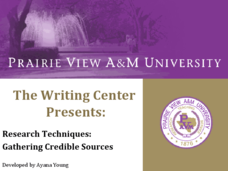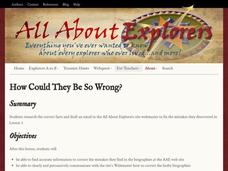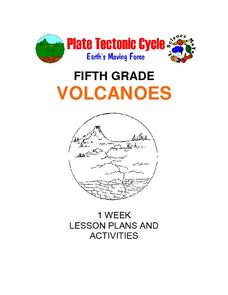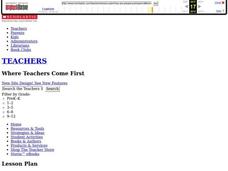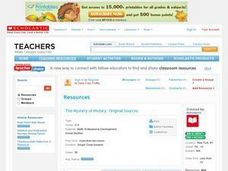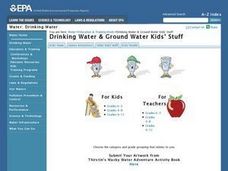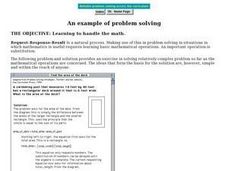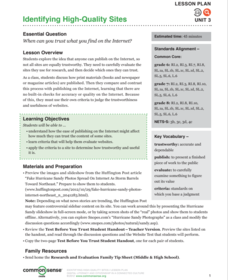Curated OER
Research Techniques: Gathering Credible Sources
How can you spot a credible source? What even makes a resource reliable in the first place? Answer some of these questions with this presentation. Although intended for higher education, this PowerPoint could be modified for middle...
Teaching Tolerance
Understanding and Evaluating Online Searches
With billions of options to choose from, how can people determine which online sources are reliable? Using an informative resource, pupils first discuss and evaluate a sample search result handout. Next, partners create a checklist for...
Curated OER
Reliability Check of Power Grid
Students complete a simulation on power grid reliability check. In this physics lesson, students discuss the consequences of power grid failures. They complete a simulation worksheet.
Curated OER
Reliability Of Your Visual Sense
Students explore visual sense. In this biology lesson plan, students perform a series of tests on the reliability of their visual sense, record their observations for each test, and conclude from their data how reliable their visual...
iCivics
NewsFeed Defenders Extension Pack
Accuracy, transparency, trustworthiness, and impartiality are four unspoken rules of journalism. Scholars delve deep into the subject by discussing the pros and cons of relying on social media for news. They also play an online game to...
Library of Congress
The Conservation Movement at a Crossroads: The Hetch Hetchy Controversy
Should wilderness areas be preserved or managed? Class members examine primary source documents, including lecture notes, articles, essays and congressional records to better understand the Hetch Hetchy controversy that created a split...
All About Explorers
How Could They Be so Wrong?
If it's on the Internet, it must be true ... right? Introduce young Internet explorers to the importance of fact-checking through a fun web-based activity. Pairs work together to read and analyze biographies about world explorers, then...
Curated OER
Understanding and Using Primary and Secondary Sources in History
Explore primary and secondary sources in this historical analysis lesson. Young researchers define the terms primary source and secondary source. They read a primary source document provided by the teacher and answer questions about the...
Curated OER
Volcanoes: Fifth Grade Lesson Plans and Activities
Fifth graders explore volcanoes and the rocks they produce using the Internet. The lab portion of the lesson prompts young scientists to compare and describe igneous rocks. Next, they critique a pair or more of books on volcanoes in...
Curated OER
HOW TO EVALUATE THE TRUSTWORTHINESS OF CONTENT-ORIENTED WEB SITES.
Students objectively learn how critically evaluate Web sites for utility, trust, and reliability. In this instructional activity, students learn that some Web sites might be deceiving in their intent despite their popularity.
Curated OER
How are People Portrayed by Different Media?
Your 9th - 12th graders can hone their analysis and critical thinking skills by studying the way a subject is portrayed across media types. They examine how various print, visual, and online sources have portrayed key players in the 9/11...
Curated OER
The Mystery of History-Original Sources
Students research the events surrounding the Alamo in 1863, and explore the differences between primary and secondary sources of information. They brainstorm lists of items used to research a subject and categorize them as primary or...
Curated OER
Sextant Solutions
Students explore ways a sextant can be a reliable tool that is still being used by today's navigators and how computers can help assure accuracy when measuring angles. This activity will show how computers can be used to understand...
Curated OER
Youth Activity: How People Get Their Water Reservoirs: "Holding Tanks" for Drinking Water
Learners experience and participate in "Riding the Water Cycle" with this lesson. They explore, analyze and study the role of reservoirs in maintaining a reliable supply of drinking water. Each student constructs a model of a reservoir.
Curated OER
Marvelous Manatees
Two groups consider whether or not the Florida manatee will become extinct during their lifetimes. They research manatee populations and statistics together and then a class debate is held. Afterwards they consider how reliable their...
Curated OER
Twain's Hannibal
Young scholars use primary resources to examine the context the writings of Mark Twain. They criticize the resources for reliability, accuracy, perspective, relevancy, and authoritativeness.
Curated OER
George Winter
Who is George Winter? Learners review knowledge of George Winter, an artist who captured images of the Trail of Tears. They distinguish the difference between primary and secondary sources and determine the reliability of a document....
Curated OER
ABO Blood Types Worksheet
Blood types and transfusions are explained in reading passages at the top of the instructional activity. A chart of blood type compatibility is also provided. Biology students answer comprehension questions and then exercise...
Curated OER
Reliable Problem Solving Techniques
Students practice the Request-Response-Result problem solving technique. They explore how and when it should be used.
Curated OER
Tell It Like It Is
Students consider the accuracy of the Web sites they regularly use, then prepare for a formal debate on the reliability of Wikipedia and similar Web sites. For homework, they prepare note cards and practice delivering their orations.
Curated OER
Fact or Fiction? Urban Legends and Misconceptions
High schoolers are introduced to a process for using web site resources to verify the accuracy of biology information. They follow a guided lesson on evaluating web sites and determining content accuracy. They select a piece of unusual...
Curated OER
Extraordinary Extrapolation
Students study how scientists have estimated the maximum height to which trees can grow, and assess the reliability of interpolation and extrapolation techniques by making predictions with particular data sets and analyzing accuracy of...
Curated OER
D.E.W. (Drop Everything and Write!)
Students gather, determine validity and reliability of, analyze and organize information. They employ the most effective format for purpose and audience. Students write fully developed paragraphs that have details and information...
Common Sense Media
Identifying High-Quality Sites
Use a Huffington Post article focused on false pictures of Hurricane Sandy to launch a discussion about the reliability of online information. Groups compare and contrast how print and broadcast media regulate data gathering with the...


